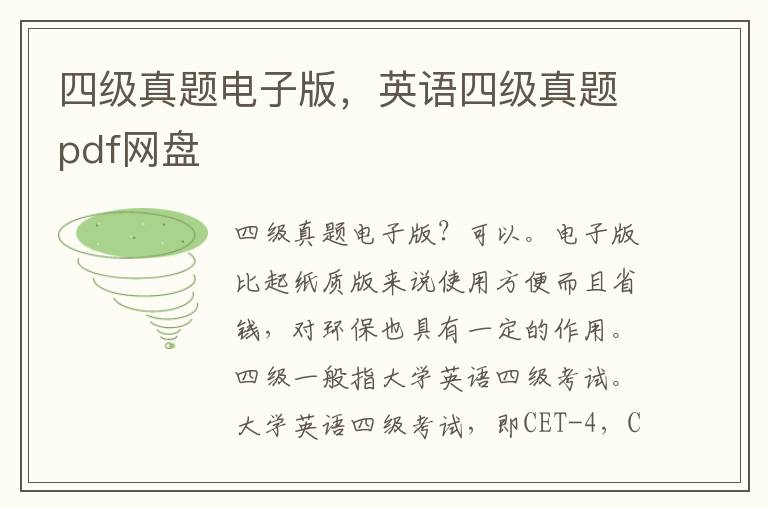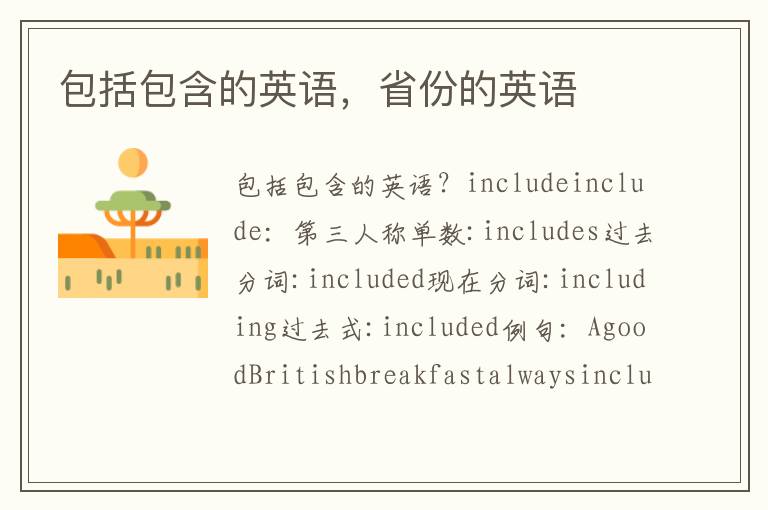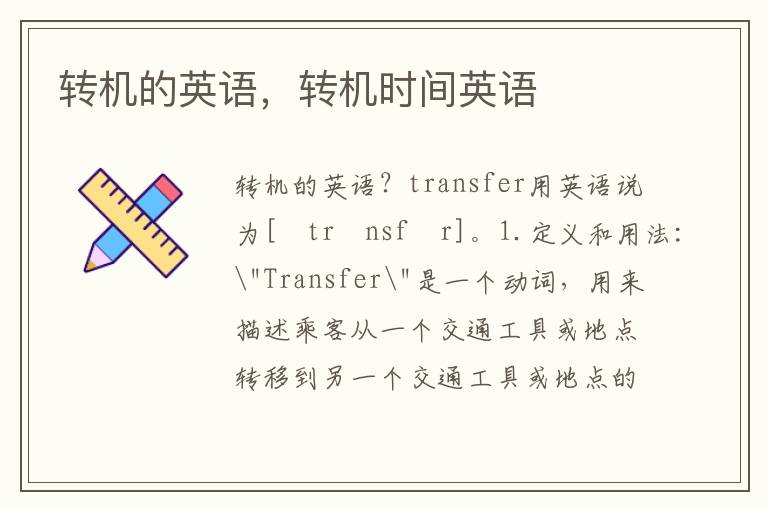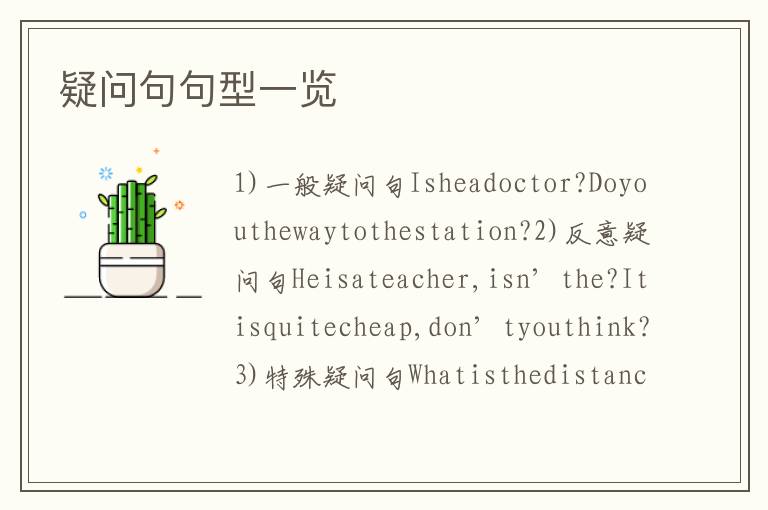【简介】感谢网友“雕龙文库”参与投稿,这里小编给大家分享一些,方便大家学习。
反义疑问句是英语四大问句之一,它是由一个陈述句加上一个短问句而构成的。反义疑问句的基本构成形式是:陈述句+动词(肯定或否定)+主语?如:
①She often has lunch at school, doesnt she? ②You dont like sports, do you?
使用反义疑问句要注意以下若干对应规则:
一、 反义疑问句中问句部分的动词与陈述部分的动词在语气上成相反的对应关系。即:
肯定+否定? 否定+肯定?如:
①You cant do it, can you? ②They are very late for the meeting, arent they?
二、 反义疑问句中问句部分的动词与陈述部分的动词种类要对应一致。如:
①He has supper at home every day, doesnt he? (不能用hasnt he?)
②They have known the matter, havent they? (不能用dont they?)
三、 反义疑问句中问句部分的动词在时态上应和陈述部分的时态一致。如:
①They will go to town soon, wont they?(不能用dont they?或 arent they?)
②He works very hard, doesnt he?(不能用didnt he?或wont he?)
四、 反义疑问句的陈述部分含有由un-, im-, in-, dis-, 等否定意义的前缀构成的词语时,陈述部分要视为肯定含义,问句部分用否定形式。如:
①Your father is unhappy, isnt he?(不能用is he?)
②The man is dishonest, isnt he? (不能用is he?)
③It is impossible to learn English without remembering more words, isnt it?(不能用is it ?)
五、反义疑问句的陈述部分带有little, few, never, hardly, seldom等否定意义的词时,问句部分用肯定式。如:
①She never tells a lie, does she?(不用doesnt she?)
②He was seldom late, was he?(不用wasnt he?)
六、反义疑问句的陈述部分为I am时,问句部分习惯上用arent I?表示。如:
I am a very honest man, arent I?
七、反义疑问句的陈述部分为I(We) think(believe, suppose, consider) + that从句时,问句部分的动词及主语与that从句内的动词和主语保持一致。如:
①I think that he has done his best, hasnt he?
②We think that English is very useful, isnt it? (不用dont we?)
八、反义疑问句的陈述部分为I(We) dont think(believe, suppose, consider)+ that从句时,从句为否定意义,问句部分的动词和主语仍与that从句保持一致且用肯定式。如:
①I dont think that you can do it, can you? (不用do I?)
②We dont believe that the news is true, is it? (不用do we?)
九、反义疑问句的陈述部分为非第一人称主语+ think(believe, suppose, consider) + that从句时,问句部分的动词和主语与陈述部分的主句动词和主语保持一致。如:
①They all think that English is very important, dont they? (不用isnt it?)
②He didnt think that the news was true, did he? (不用wasnt/ was it?)
十、反义疑问句的陈述部分为主语+said( told, reported, asked) + that从句时,问句部分的动词和主语与陈述部分的主句动词和主语保持一致。如:
①They said that you had finished your work, didnt they? (不用hadnt you)
②Kate told you that she would go there, didnt she? (不用wouldnt she?)
十一、陈述部分的主语为不定代词something, anything, nothing, everything时,问句部分的主语用it。如:
①Something is wrong with the computer, isnt it?②Nothing has happened to them, has it?
十二、陈述部分的主语为不定代词somebody(someone), anybody(anyone), nobody(no one), everybody(everyone)时,问句部分的主语用he或 they,这时问句动词的数应和he或they一致。如:
①Someone has taken the seat, hasnt he?
②Everyone has done their best in the game, havent they?
十三、陈述部分为Let me时,问句部分习惯上用shall I? 或will you?形式。如:
Let me have a try, shall I?(will you?)
十四、陈述部分为Let us时,问句部分习惯上用will you?形式。如:
Let us stop to rest, will you?
十五、陈述部分为Lets时,问句部分习惯上用shall we?形式。如:
Lets go home together, shall we?
十六、陈述部分用上述情况以外的祈使句时,问句部分一般用will you?形式表示请求,用wont you?形式表示委婉请求或邀请。如:
①Do sit down, wont you?/ will you? ②You feed the bird today, will you?
③Please open the window, will you?(wont you?)
十七、陈述部分为否定祈使句时,问句部分一般用will you?形式。如:
Dont make any noise, will you?
十八、陈述部分为There (Here) + be + 主语时,问句部分用动词+there(here)?形式。如:
①There are two cakes on the plate, arent there? ②Here is a story about Mark Twain, isnt here?
十九、陈述部分用had better +原形动词表示建议时,问句部分用hadnt +主语?形式。
①Youd better tell him about the matter, hadnt you?
②We had better do it by ourselves, hadnt we?
二十、陈述部分用used to +主语时,问句部分用didnt + 主语?或usednt +主语?形式。
①He used to live in the country, didnt he?/usednt he?
②They used to be good friends, didnt they?/usednt they?
二十一、陈述部分用must(may, might) + have + V-ed表示推测时,若句中带有明显的过去时间的状语,问句部分动词用过去时形式。如:
①He might have forgotten his pen in the classroom yesterday, didnt he?
(不用mightnt he?/ hasnt he?)
②You must have got up late this morning, didnt you?(不用mustnt you?/havent you?)
二十二、陈述部分用must(may, might) + have + V-ed表示推测时,若句中没有带明显的过去时间的状语,问句部分动词用现在完成时形式。如:
①Everyone must have known the death of the waitress, havent they? (不用mustnt they?)
②You must have worked there a year ago, didnt you?(不用mustnt you?/ havent you?)
二十三、陈述部分的主语为从句时,问句部分的主语一般用it代替。如:
①What he said is true, isnt it? (不用didnt he?)
②Where we will build the dam has not been decided yet, has it? (不用wont we?)
二十四、陈述部分的主语为动名词或不定式时,问句的主语用it代替。如:
①To do one good deed is easy for a person, isnt it?
②Skating is your favorite sport, isnt it?
反义疑问句是英语四大问句之一,它是由一个陈述句加上一个短问句而构成的。反义疑问句的基本构成形式是:陈述句+动词(肯定或否定)+主语?如:
①She often has lunch at school, doesnt she? ②You dont like sports, do you?
使用反义疑问句要注意以下若干对应规则:
一、 反义疑问句中问句部分的动词与陈述部分的动词在语气上成相反的对应关系。即:
肯定+否定? 否定+肯定?如:
①You cant do it, can you? ②They are very late for the meeting, arent they?
二、 反义疑问句中问句部分的动词与陈述部分的动词种类要对应一致。如:
①He has supper at home every day, doesnt he? (不能用hasnt he?)
②They have known the matter, havent they? (不能用dont they?)
三、 反义疑问句中问句部分的动词在时态上应和陈述部分的时态一致。如:
①They will go to town soon, wont they?(不能用dont they?或 arent they?)
②He works very hard, doesnt he?(不能用didnt he?或wont he?)
四、 反义疑问句的陈述部分含有由un-, im-, in-, dis-, 等否定意义的前缀构成的词语时,陈述部分要视为肯定含义,问句部分用否定形式。如:
①Your father is unhappy, isnt he?(不能用is he?)
②The man is dishonest, isnt he? (不能用is he?)
③It is impossible to learn English without remembering more words, isnt it?(不能用is it ?)
五、反义疑问句的陈述部分带有little, few, never, hardly, seldom等否定意义的词时,问句部分用肯定式。如:
①She never tells a lie, does she?(不用doesnt she?)
②He was seldom late, was he?(不用wasnt he?)
六、反义疑问句的陈述部分为I am时,问句部分习惯上用arent I?表示。如:
I am a very honest man, arent I?
七、反义疑问句的陈述部分为I(We) think(believe, suppose, consider) + that从句时,问句部分的动词及主语与that从句内的动词和主语保持一致。如:
①I think that he has done his best, hasnt he?
②We think that English is very useful, isnt it? (不用dont we?)
八、反义疑问句的陈述部分为I(We) dont think(believe, suppose, consider)+ that从句时,从句为否定意义,问句部分的动词和主语仍与that从句保持一致且用肯定式。如:
①I dont think that you can do it, can you? (不用do I?)
②We dont believe that the news is true, is it? (不用do we?)
九、反义疑问句的陈述部分为非第一人称主语+ think(believe, suppose, consider) + that从句时,问句部分的动词和主语与陈述部分的主句动词和主语保持一致。如:
①They all think that English is very important, dont they? (不用isnt it?)
②He didnt think that the news was true, did he? (不用wasnt/ was it?)
十、反义疑问句的陈述部分为主语+said( told, reported, asked) + that从句时,问句部分的动词和主语与陈述部分的主句动词和主语保持一致。如:
①They said that you had finished your work, didnt they? (不用hadnt you)
②Kate told you that she would go there, didnt she? (不用wouldnt she?)
十一、陈述部分的主语为不定代词something, anything, nothing, everything时,问句部分的主语用it。如:
①Something is wrong with the computer, isnt it?②Nothing has happened to them, has it?
十二、陈述部分的主语为不定代词somebody(someone), anybody(anyone), nobody(no one), everybody(everyone)时,问句部分的主语用he或 they,这时问句动词的数应和he或they一致。如:
①Someone has taken the seat, hasnt he?
②Everyone has done their best in the game, havent they?
十三、陈述部分为Let me时,问句部分习惯上用shall I? 或will you?形式。如:
Let me have a try, shall I?(will you?)
十四、陈述部分为Let us时,问句部分习惯上用will you?形式。如:
Let us stop to rest, will you?
十五、陈述部分为Lets时,问句部分习惯上用shall we?形式。如:
Lets go home together, shall we?
十六、陈述部分用上述情况以外的祈使句时,问句部分一般用will you?形式表示请求,用wont you?形式表示委婉请求或邀请。如:
①Do sit down, wont you?/ will you? ②You feed the bird today, will you?
③Please open the window, will you?(wont you?)
十七、陈述部分为否定祈使句时,问句部分一般用will you?形式。如:
Dont make any noise, will you?
十八、陈述部分为There (Here) + be + 主语时,问句部分用动词+there(here)?形式。如:
①There are two cakes on the plate, arent there? ②Here is a story about Mark Twain, isnt here?
十九、陈述部分用had better +原形动词表示建议时,问句部分用hadnt +主语?形式。
①Youd better tell him about the matter, hadnt you?
②We had better do it by ourselves, hadnt we?
二十、陈述部分用used to +主语时,问句部分用didnt + 主语?或usednt +主语?形式。
①He used to live in the country, didnt he?/usednt he?
②They used to be good friends, didnt they?/usednt they?
二十一、陈述部分用must(may, might) + have + V-ed表示推测时,若句中带有明显的过去时间的状语,问句部分动词用过去时形式。如:
①He might have forgotten his pen in the classroom yesterday, didnt he?
(不用mightnt he?/ hasnt he?)
②You must have got up late this morning, didnt you?(不用mustnt you?/havent you?)
二十二、陈述部分用must(may, might) + have + V-ed表示推测时,若句中没有带明显的过去时间的状语,问句部分动词用现在完成时形式。如:
①Everyone must have known the death of the waitress, havent they? (不用mustnt they?)
②You must have worked there a year ago, didnt you?(不用mustnt you?/ havent you?)
二十三、陈述部分的主语为从句时,问句部分的主语一般用it代替。如:
①What he said is true, isnt it? (不用didnt he?)
②Where we will build the dam has not been decided yet, has it? (不用wont we?)
二十四、陈述部分的主语为动名词或不定式时,问句的主语用it代替。如:
①To do one good deed is easy for a person, isnt it?
②Skating is your favorite sport, isnt it?









